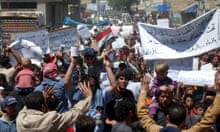Protests erupted across Syria on Monday in response to Bashar al-Assad's widely anticipated speech, in which he vowed not to give in to the "saboteurs" he said were wrecking the country, while offering the prospect of multi-party elections and an end to four decades of totalitarian rule.
In his first public address in two months, the president called for a national dialogue and suggested the Ba'ath party, which has had a pervasive presence in Syrian affairs since 1963, would play a diminished role.
However, the speech failed to meet the expectations of Syrian opposition figures who had demanded an immediate timetable for radical reform and an end to the army's brutal crackdown against demonstrators. They saw it as too little, too late.
The suggested reforms, while light on detail, were the broadest Assad has mooted in his three addresses since protests began. Each of his speeches has hailed a need to reform the region's most rigid police state in the wake of the revolutions in Egypt and Tunisia.
But the British foreign secretary, William Hague, described the speech as "disappointing and unconvincing". He said: "If President Assad is to restore any credibility, the Syrian people need to see concrete action, not vague promises … there must also be an immediate end to violence by Syrian security forces, the release of all political prisoners [and] an end to the torture and abuse."
Europe and Turkey, who have increasingly railed against Assad, were also underwhelmed. The EU on Monday night agreed to intensify financial sanctions, which have already isolated Assad and members of the ruling family. France said Assad was at the point of no return.
As soon as the hour-long address was over, protests erupted in the capital Damascus, the commercial hub Aleppo, Deraa in the south, Hama near the Lebanese border, and other towns and cities, activists said. A centrepiece of Assad's address – a call for national dialogue – was seen by a dissident group, the Local Co-ordinating Committee, as a bid to buy time while security sweeps continued.
Crowds in numerous towns chanted: "the people want to overthrow the regime". Others said Assad remained in denial about the momentum of a nationwide democracy movement. However, Assad, the president for the past 11 years, appeared to acknowledge that he was fighting for his survival as leader. His address was delivered to a sombre audience in Damascus University, not the rapturous throng of Ba'ath party loyalists that continually lauded him during a speech to the Syrian parliament in March.
Assad tried to strike a more conciliatory tone, describing some opposition demands as legitimate and suggesting that he and other senior regime figures had met demonstrators. However, he did not stray far from his hardline stance. "We will not be soft on anyone," he said. "We cannot be lenient. The damage is affecting everyone." He described the protesters as "germs". Opposition activists say at least 1,400 people have been killed and 10,000 arrested since protests began in March.
Assad retains strong support in Damascus, but dissidents in the capital are becoming more vocal. "I would have accepted this speech last year, but we are now in a different era," said one opposition analyst in Damascus. "He spoke of reforms when what people now want to hear about is freedoms. They want to know that no one is above the law.
"Assad and the ruling family are not politicians, therefore we cannot easily expect a political solution."
Another activist hoped he would suffer the same fate as the fallen leaders of Egypt and Tunisia. He said: "This was Assad's third speech and – we hope – his last. Mubarak and Ben Ali both had three so we are making that comparison."
Assad drew his strongest applause when he pledged to tackle nepotism and corruption – two elements of his rule that have infuriated Syrians. Last week his powerful cousin, the tycoon Rami Makhlouf, pledged to move out of business and into philanthropy in a move widely believed to have been ordered by regime leaders.
Assad also conceded that the economy was under serious strain: "The collapse of the Syrian economy is the most serious problem that we are facing so far. We need a new economic system that will be suitable to Syria."
The address seemed tailored for international consumption as much as for Syrians. However, embassy officials in Beirut said they had seen little that would extricate Assad from a fast-escalating crisis. "His sincerity has long been doubted," said one ambassador, on condition of anonymity. "And that is the problem for him. Europe doesn't believe him any more. Only the Russians are saving him from a much more serious situation and that is not because they like him. They are doing it for their own ends."
Nidaa Hassan is the pseudonym of a journalist working in Damascus



